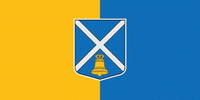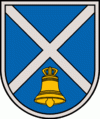Iecava Municipality (Iecavas Novads)
 |
 |
On 1 July 2021, Iecava Municipality ceased to exist and its territory was merged with Bauska Municipality as Iecava Parish.
Iecava was first mentioned in 1492, when the Master of the Livonian Order, Johann Freytag von Loringhoven, issued a document regarding the duties of peasants from Iecava and Mežotne regarding the local estate.
There is earlier proof of inhabitants of Semigallia settling the area. Today, in the center of Iecava, there was a camp, in which there have been found many items even from the Stone Age such as war hammers and work hammers. Two early tombs of the Iron Age were also explored.
In the 14th century Iecava was subordinated into the Livonian Order. From mid 16th century to end of 18th century the town was part of the Duchy of Courland. In 1567, with the order of the Duke of Courland, a separate Iecava-Lambarte congregation was founded, for which the Lutheran Church began to be built in 1641. During the Duchy of Courland in 1652.-1845. Iecava became a local industrial center with copper, tar, lime, brick and coal kilns, dolomite quarries, paper mills, flax and monochrome weave weaver, and stud workshops. Cannons (two of them are displayed in the center of Iecava), cannon balls, ship nails, and boilers were produced.
After adding Courland to Russian Empire, Iecava became a crown manor. In 1795, the estate was acquired by Count Peter von der Paul, to whom the Russian Empress Catherine II donated the previously rented Lieliecava manor, and came to Paul's "eternal ownership". Count Paul's reign brought Iecava a lively boom - at the end of the 18th century Iecava castle was built, 1795-1890. created an English-style landscape park of 17.2 hectares with a large variety of native tree species and exotic species.
During the Napoleon's invasion of Russia in 1812, significant fights took place in Iecava. During the French invasion, Colonel de Tolly, the brother of the famous Russian officer Michael Barclay de Tolly, died here. Legends say that several bullets fired during the campaign have left marks still visible on the walls of Iecava Church. On July 7, 1812, the Battle of Iecava took place, where the French army, led by generals von Grawert and Kleist von Nollendorf, defeated Russian troops.
In the 19th century there were 16 manors in the territory of Iecava (Branti, Briede, Grienvalde, Misa, Zorģe manor, etc.). In 1827 the Dzimtmisa School was opened, 1858. - the Iecava School, 1864. - the Misa School. At the end of the 19th century, the rapid development of capitalism and the geographical position of Iecava contributed to the development of the village and its administrative center. In 1869 a parish house was built, in 1876 - the school of Iecava parish. In 1885, a pharmacy was opened in Iecava, which is still in operation in this building. In 1891, the new Peace Court building, including customs, police, post office (now houses a cultural house), was completed. During this time, too, Craftsmen's House (now - post office).
During the first world war, two years in the vicinity of the frontline, Iecava was hit hard. Iecava Palace was destroyed in 1915 with the deportation of the Russian army from Riga. From the palace complex, the library housing of the Earl Leonid von der Pahlen, the horse stables, and the three park guards' houses have remained.
Although Iecava suffered greatly during the First World War - there were only 43 homes with 139 inhabitants in the 1920s - it quickly recovered due to convenient traffic and fertile soils.
Map - Iecava Municipality (Iecavas Novads)
Map
Country - Latvia
 |
 |
| Flag of Latvia | |
After centuries of Teutonic, Swedish, Polish-Lithuanian and Russian rule, which was mainly executed by the local Baltic German aristocracy, the independent Republic of Latvia was established on 18 November 1918 when it broke away from the German Empire and declared independence in the aftermath of World War I. However, by the 1930s the country became increasingly autocratic after the coup in 1934 establishing an authoritarian regime under Kārlis Ulmanis. The country's de facto independence was interrupted at the outset of World War II, beginning with Latvia's forcible incorporation into the Soviet Union, followed by the invasion and occupation by Nazi Germany in 1941, and the re-occupation by the Soviets in 1944 to form the Latvian SSR for the next 45 years. As a result of extensive immigration during the Soviet occupation, ethnic Russians became the most prominent minority in the country, now constituting nearly a quarter of the population. The peaceful Singing Revolution started in 1987, and ended with the restoration of de facto independence on 21 August 1991. Since then, Latvia has been a democratic unitary parliamentary republic.
Currency / Language
| ISO | Currency | Symbol | Significant figures |
|---|---|---|---|
| EUR | Euro | € | 2 |
| ISO | Language |
|---|---|
| LV | Latvian language |
| LT | Lithuanian language |
| RU | Russian language |















